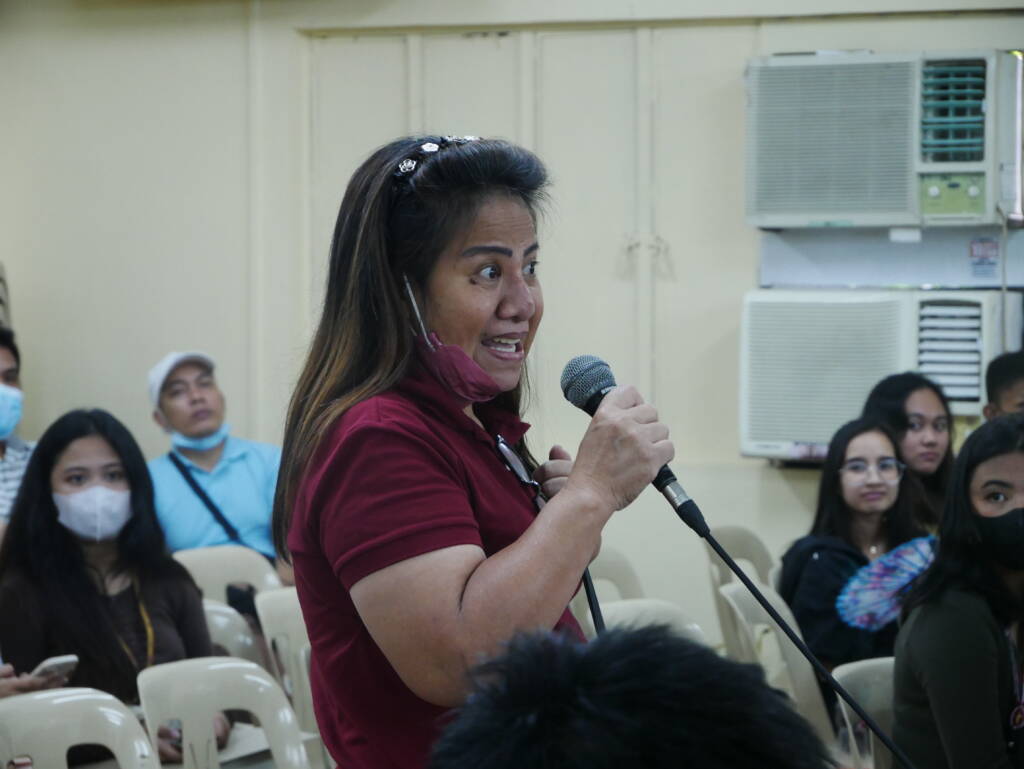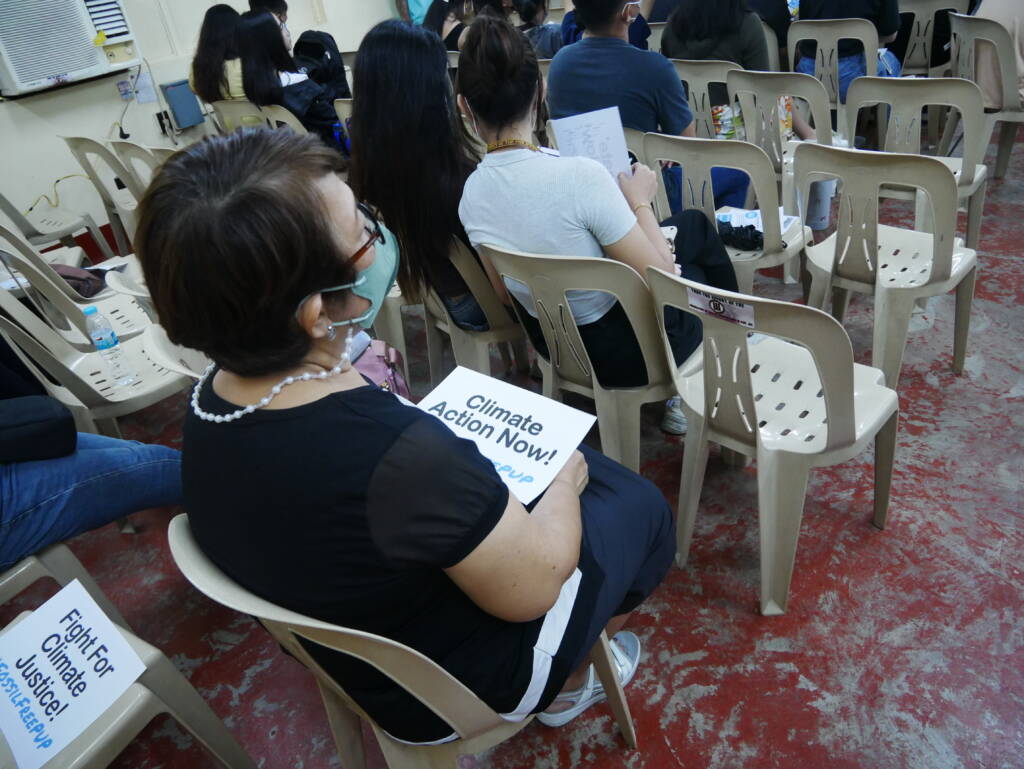Chuck Baclagon
My alma mater the Polytechnic University of the Philippines (PUP) is no stranger to radical discourse. In fact it has carved its place in history as a progressive institution and has been a bastion of activism for decades, the very same place that jump started my journey that led me to climate advocacy.
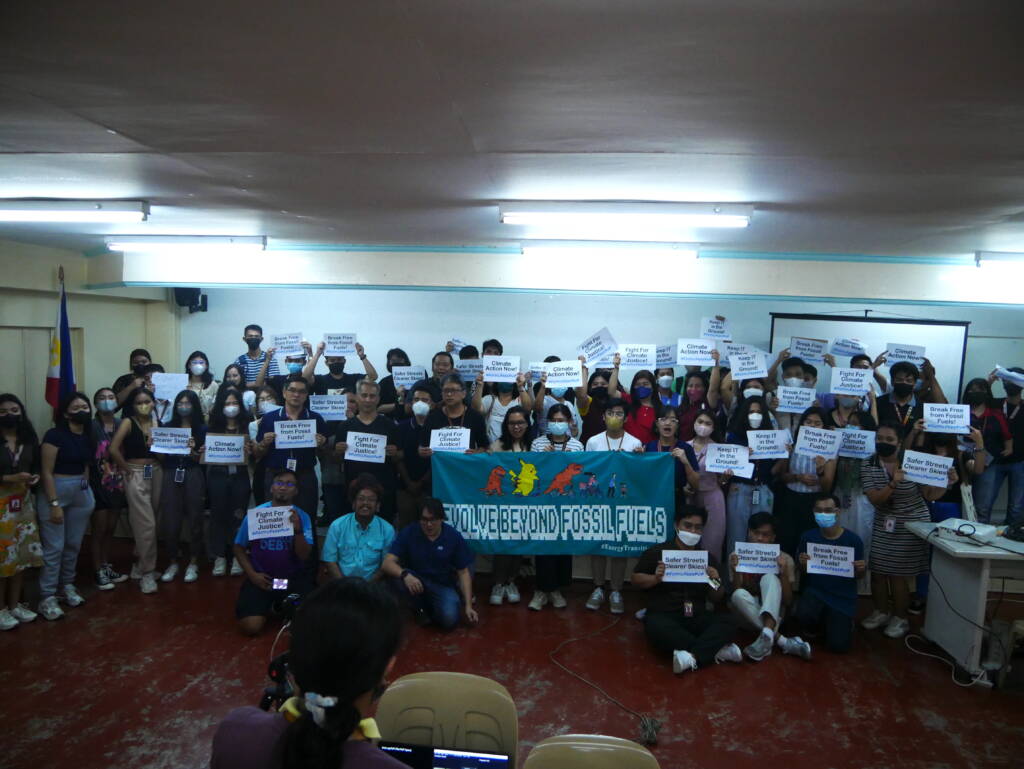
350 Secretariat, Students from PUP-Manila, Youth organizations along with Center for Environmental Studies PUP, Agham Youth PUP , PUP College of Science Student Council, and PUP Institute of Technology Research and Extension. Photo: Johnny Guarin
On March 31, 2023, I had the opportunity to speak at a forum called “Fossil Free World is Possible” at PUP’s Institute of Technology. The event was organized in collaboration with several student groups, including the Center for Environmental Studies, Agham Youth, the PUP College of Science Student Council, and the PUP Institute of Technology Research and Extension. I discussed the link between climate, energy, and transportation, and how collective action is crucial for climate justice campaigns.
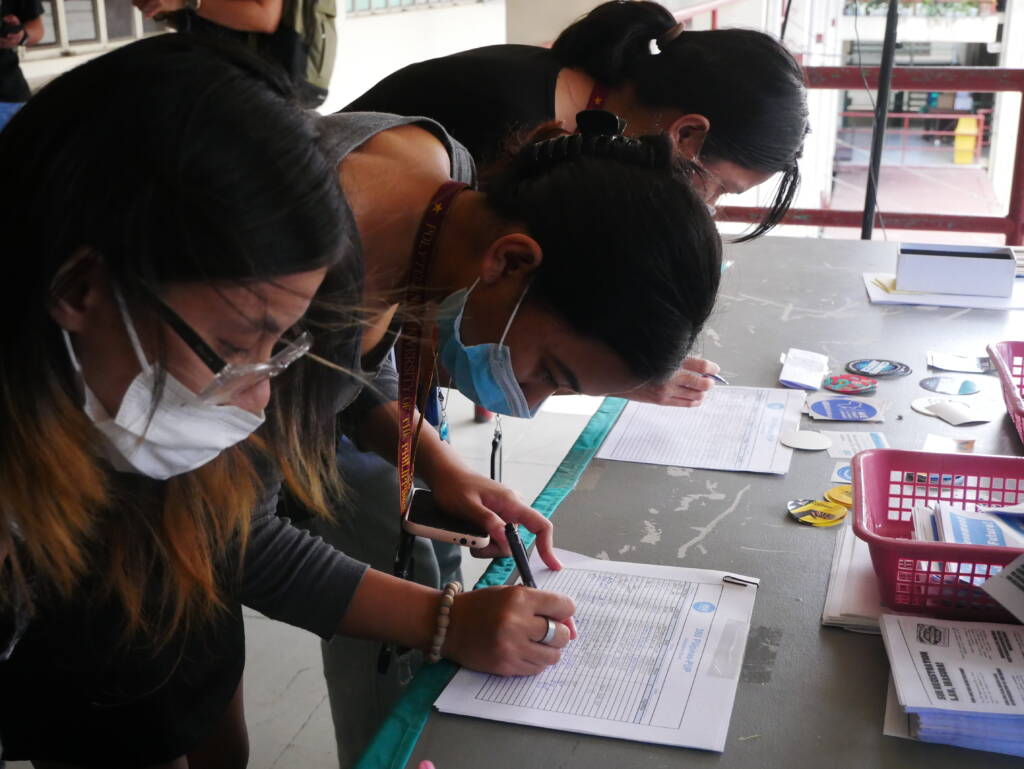
Students from Polytechnic University of the Philippines register at the Fossil Free World is Possible Forum, Photo: Nadia Cruz
It was a daunting task for several reasons. The last time I gave a presentation in person was before the COVID-19 lockdowns 3 years ago, by the same token I am also well aware of how its students can be quite inquisitive to which I feel I am not prepared. Thankfully I was not alone in the room as I was in the presence of very able reactors that also gave valuable insights to supplement the items covered in my presentation.
Nevertheless I found the experience rewarding, as it served as a platform for conversation on the complex interplay of factors that influence the experience of climate change and the implementation of solutions at the grassroots level, raising very important questions related to how we can bridge the conceptual with the practical –a crucial point that needs to be addressed on a topic like decarbonization.
Bridging the emissions gap
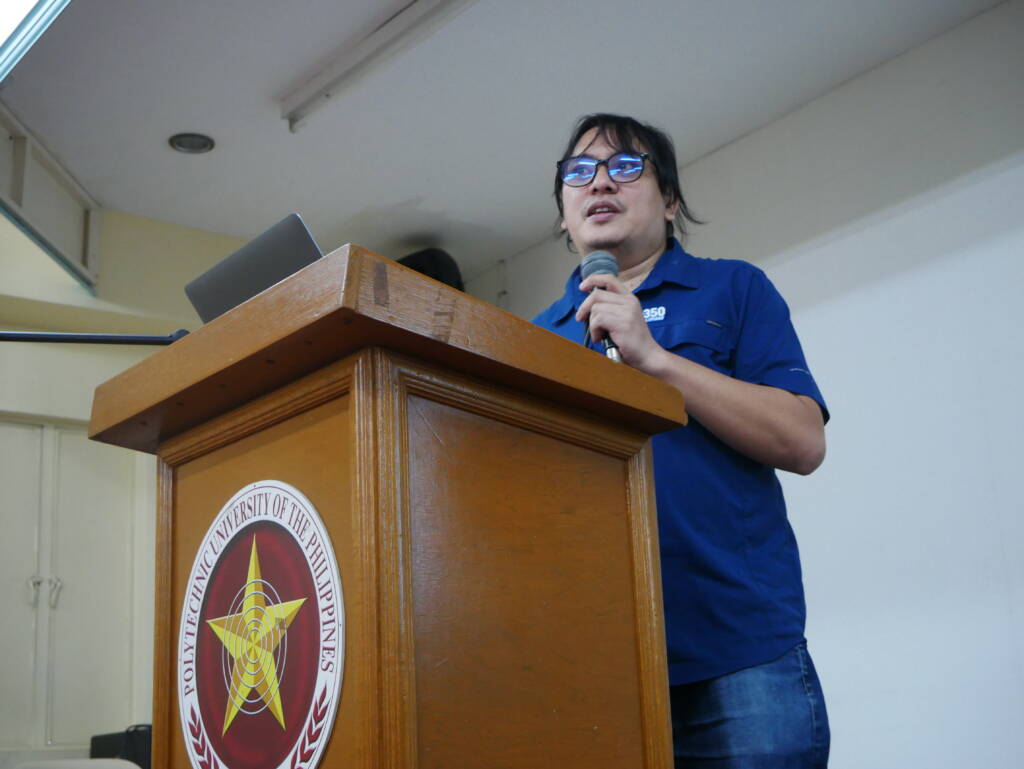
Chuck Baclagon, Finance Campaigner of 350 Asia, discussing presentation on Climate Action Based on Science & Justice Local to Global Pathways for Decarbonization. Photo: Nadia Cruz
Carbon dioxide stays in the atmosphere longer than other greenhouse gases due to human activities. It’s crucial to limit global net human-caused emissions of carbon dioxide to prevent catastrophic warming, with the red line set at 1.5°C. The carbon budget until 2030 is 770 gigatonnes, and the proven reserves of the fossil-fuel industry are 2,795 gigatonnes. To stay below 1.5°C, global coal, oil, and gas production must decline annually by 11%, 4%, and 3%, respectively, between 2020 and 2030.
Limiting global warming to below 1.5°C requires urgent actions, including reducing global net human-caused emissions of carbon dioxide, keeping coal, oil, and gas in the ground, transitioning to 100% renewable energy systems, and making significant changes in land use, energy systems, industry, buildings, transport, and cities.
As an island nation, the Philippines is highly vulnerable to climate change impacts such as weather disasters, sea-level rise, extreme rainfall, and resource shortages. These have devastating effects on agriculture, water, infrastructure, human health, and coastal ecosystems. Climate change is also expected to continue damaging the economy and society. Therefore, it’s important to identify local-to-global pathways responding to the climate crisis, linking climate action to sustainable development and community ownership of solutions to achieve measurable outcomes and co-benefits.
For this large task, community-led interventions on renewable energy and inclusive mobility are important.
Decarbonizing energy systems involves changing the way we use, produce, and distribute energy by utilizing renewable energy. This helps to increase access to power while decreasing reliance on fossil fuels. Renewable energy has a decentralized nature that’s compatible with various regions and allows for the use of local renewable sources where communities can own and control energy production. Embracing renewable energy can create a sustainable and fair energy system that benefits everyone.
Transportation is responsible for a significant portion of global energy use and carbon emissions. Most efforts to reduce emissions have focused on improving vehicles, engines, and fuel types, but understanding the problem requires looking at the transport sector’s infrastructure, modality of travel, business models, and culture. Car-centric urban development exacerbates the transportation crisis, especially in cities like Manila, where most households don’t own cars. Improving public transport means making it safer, cleaner, and more affordable, to create a sustainable and fair transport system that prioritizes people over cars.
Think global. Act local.
We aim to launch an initiative that encourages innovation and reduces carbon emissions while rebuilding after the COVID-19 pandemic in the PUP campus and community. We seek to bring together university administrators, faculty, and students to work on local programs that have measurable outcomes and show how local climate action has immediate benefits on the campus level.
It involves researching applicable policies, conducting energy and accessibility audits, exploring energy efficiency and renewables, developing infrastructure for active transport, providing access for bimodal commutes, and setting up solar-powered charging stations that are accessible to students. By forming partnerships among university stakeholders, we can act on climate change and create a more sustainable future for college campuses and beyond.
Lifestyle change, technological fixes and public transportation
On a personal level I found more value in the interactions with the participants as they gave incisive comments and raised important questions that emphasized the importance of centering our work with the audience in mind.
An important aspect I noticed was there is unanimous agreement in the need for better transport systems that supports multimodal transportation in going to PUP.
While on other questions I was taken aback because of the salient points they make.
One of the participants, who is part of the university’s administration staff, asked about how she can be involved as a working mother given the scope of her present responsibility.
The question reminded me of the time when I worked in a campaign at Greenpeace that emphasized that although climate change is a major threat, individuals can help by doing simple things like turning off lights and unplugging appliances when not in use, using natural lighting, and taking public transport. These actions can shape consumption habits and cumulatively reduce the need for more energy capacity, of course these lifestyle changes are important and can be our starting point in our journey towards climate advocacy but we also need to recognize that it can never be enough which is why collective action is necessary especially from those in positions of power that determine the trajectory of economic development.
Another curiosity was when a student participant raised his hand to tell his story about how he grew up in Dubai and made a comparison about how there seems to be a drive from the government towards environmental sustainability in terms of providing efficient mass transport systems and by promoting a paperless society through digitization.
Without going into the intricacies of how countries like Dubai, built their economy from fossil fuel exploration and extraction I responded by highlighting the importance of understanding the difference of context in the campaign landscapes we operate in.
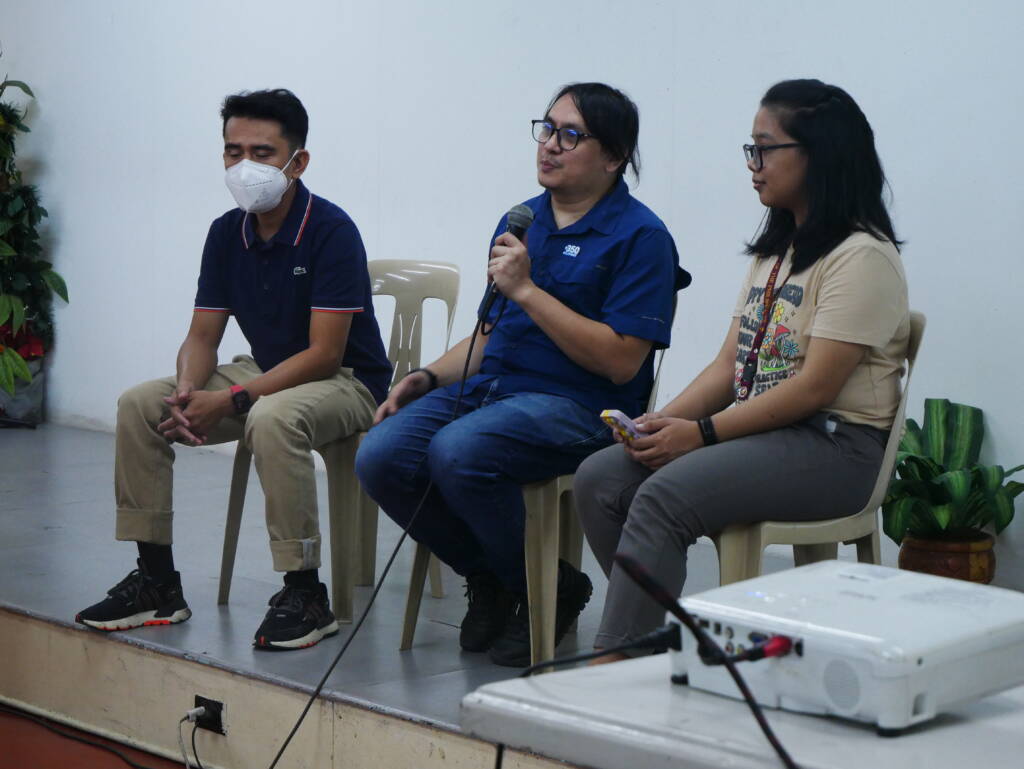
(From left to right) Kelly from Agham Youth, Chuck Baclagon, and Aldrin Pelicano from Mobility Awards answering queries in the open forum. Photo: Johnny Guarin
I nodded in agreement with the point about how the government should be doing more to provide efficient transportation options for everyone. However I took particular interest in responding to the proposition of going paperless with a story from an old campaign that I was involved in when I was still working at Greenpeace, 11 years ago called Facebook: Unfriend Coal.
Data centers, such as the one built by Facebook in Prineville, Oregon, are responsible for keeping websites like Facebook running without downtime. However, most data centers rely on coal-fired plants to meet the increasing digital demands, leading to surging unhealthy emissions.
In 2010, Facebook announced that their Prineville data center would be powered by Pacific Power, whose primary power-generation fuel is coal, sparking concern among environmentalists. Greenpeace launched a two-year campaign to convince Facebook to switch to renewables, arguing that using energy from burning coal supports the biggest source of man-made CO2 emissions in the world, leading to global warming and climate change.
After 20 months of mobilizing and negotiating, Facebook announced its goal to run on clean, renewable energy, sending a clear message to energy producers to invest in renewables and move away from coal power.
The reason I shared the story is to highlight an important point of how campaigning should be about finding the balance between cost and benefits in deploying interventions to solve particular needs.
Like in the case of going paperless —while there is sufficient argument for its pursuance, because it reduces demands for pulp and paper it is equally energy intensive to run data centers and the same thing can be noted with the recent surge of crypto currency, artificial intelligence and web-based applications which require a lot of energy to compensate for the high computing power needed for those computers to do their work.
Building campus-based climate movements
To tackle climate change, it is important to lead sustainable lives and hold regular educational discussions on the issue. It is also vital to engage with oppressed and marginalized groups, to be able to launch climate campaigns that respond to community needs, and promote sustainability based on justice and equity.
Because ultimately, climate action should also be about emancipation of the oppressed and marginalized from a cycle of victimization and ensuring their rightful place in shaping the future of our planet.

